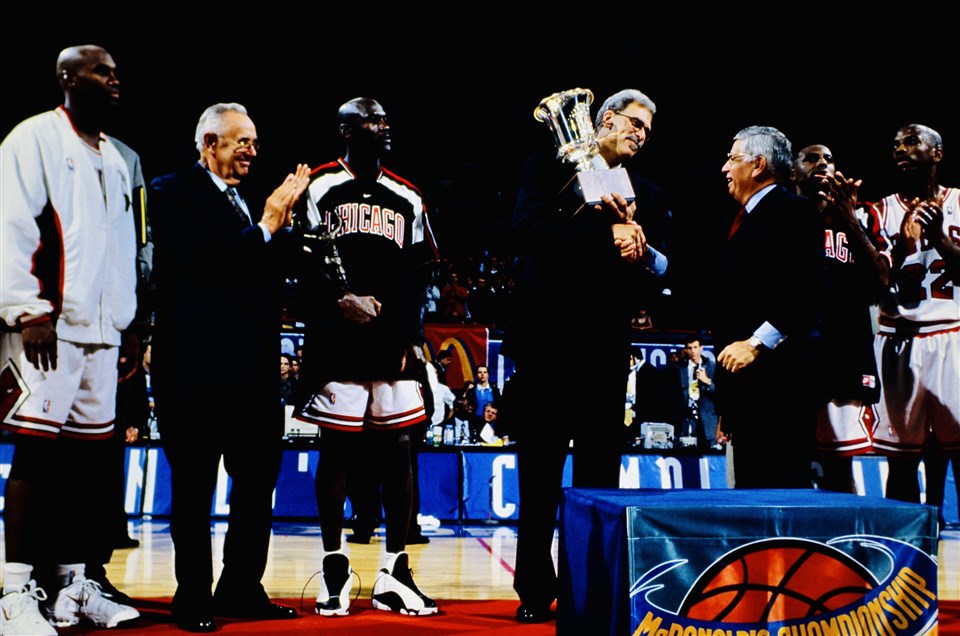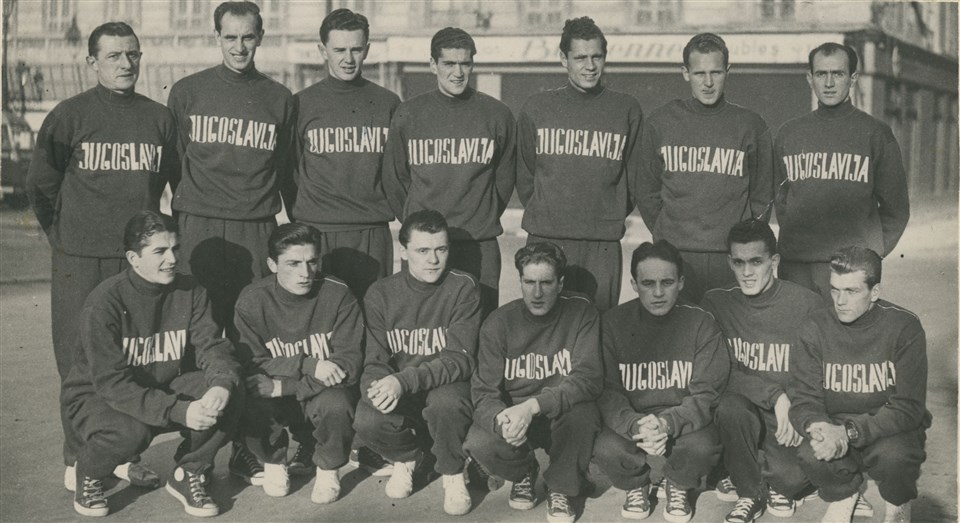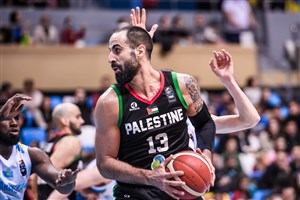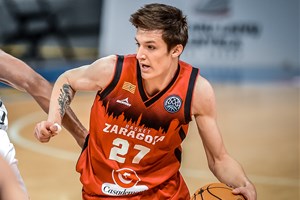
Stankovic was the driving force for the globalization of basketball
VALENCIA (Jeff Taylor's Eurovision) - The world of basketball lost a giant on March 20 when FIBA Secretary General Emeritus, Borislav Stankovic, passed away. He was 94.
Stankovic, one of the fathers of Yugoslavian basketball, along with Nebojsa Popovic, Radomir Saper and Aleksandar Nikolic, is best known internationally for having been at the helm of FIBA as Secretary General for 26 years.
While he'll be lauded for having a considerable impact on the game in a myriad of ways, like his work with rules and contributions to setting up club competitions, there is little doubt that most will remember him for taking international basketball to a higher, more competitive level.
 Stankovic (right) learned under the first FIBA Secretary General, William Jones (middle)
Stankovic (right) learned under the first FIBA Secretary General, William Jones (middle)
Yes, if he had a crowning achievement, former NBA Commissioner David Stern put it best four years ago when he said: "No one has contributed to the globalization of basketball more than my friend, Bora Stankovic."
Stankovic had very clear views about the need for the game to have its best players competing against each other on the biggest stages of basketball, like the Olympics. The game itself would be more appealing, and it would also have a far reaching impact.
In Memoriam: Borislav Stankovic (1925-2020), Former FIBA Secretary General pic.twitter.com/MoGvqa5BhK
— NBA History (@NBAHistory) March 21, 2020
In his autobiography that was published by the Serbian Basketball Federation in 2016, a book called The Game of My Life, Stankovic spoke with a sense of wonder at how the 1992 Barcelona Olympics had ignited interest in the sport.
Getting the USA Dream Team to those Summer Games altered the course of basketball. It was a milestone in the history of the sport.
Michael Jordan, Magic Johnson, Larry Bird, David Robinson, Scottie Pippen, Patrick Ewing, Charles Barkley, Karl Malone, John Stockton, Clyde Drexler, Chris Mullin and Christian Laettner had dominated, averaging an Olympic record 117.3 points a game. The USA won by an average of 43.8 points on their way to the gold medal.
What mattered was the overall impact the Dream Team had made. They had captured the imagination and other countries, like Croatia in the Final, had had an opportunity to measure themselves against the best.
"After the Olympics," Stankovic said, "millions of children all over the world watching all that basketball talent on the court were inspired to bounce the ball on the floor rather than kick it."
It wasn't easy getting to that point, however. Before the Olympics, Stankovic and Stern, together, had to lobby for the sport to be more unified.
First, their efforts led the McDonald's Open being staged in Milwaukee, in 1987. The Milwaukee Bucks, reigning European club champions Olimpia Milano and the European national team powerhouse, the Soviet Union, all took part.
 Stankovic applauded the Chicago Bulls after their 1997 McDonald's Championship triumph
Stankovic applauded the Chicago Bulls after their 1997 McDonald's Championship triumph
In 1988, the second McDonald's Open was staged in Madrid, Spain, only this time with four teams: the Boston Celtics, Scavolini Pesaro, the Yugoslavia national team and hosts Real Madrid. There were also McDonald's Opens in 1989, 1990 and 1991, won by Denver, New York and the Los Angeles Lakers, respectively.
Stankovic knew that having professional players at the Olympics would have a far bigger impact, and he made sure it would happen. In 1989, the FIBA Congress dropped the word "Amateur" from its name and the Federation Internationale de Basketball Amateur became the Federation Internationale de Basketball.
Stankovic explained why NBA players needed to be at the Olympics and World Cups.
"Two reasons," he said. "Our competition was closed to the NBA players, but no one else. That seems immoral. The second is very simple. Our feeling is that only by playing with the best players in the world can everyone else make progress. If you are from another country and you can run a race against Carl Lewis, maybe you don't have a chance. But you still want to run."
Now, more and more players from Europe and other parts of the world compete in the NBA. And USA teams, though usually the favorites, are no longer a lock to win the big tournaments, as the 2002, 2006 and 2019 FIBA Basketball World Cups, and the 2004 Olympics, showed.
 Eight years after the Dream Team, Stankovic watched the USA edge Lithuania in Sydney
Eight years after the Dream Team, Stankovic watched the USA edge Lithuania in Sydney
Lithuania almost upset the USA at the 2000 Olympics in the Semi-Finals, losing by just two points. Yugoslavia did overcome the USA in the Quarter-Finals of the World Cup two years later in Indianapolis, en route to the world title. At the 2004 Olympics in Greece, Argentina beat the USA in the Semi-Finals before capturing the gold medal. Spain were world champions in 2006 and 2019, and also played the USA in very competitive Olympic Finals in 2008 and 2012.
Stankovic was loved in his homeland, where fans, players and coaches held him in the highest regard.
"He deserved to leave us in some better time than this (Covid-19 pandemic), so we could send this great man off as he deserved," said former Yugoslavia, and Serbia coach Dusan Ivkovic.
"Last year, at the Acropolis Cup, Georgios Vassilakopoulos, the president of the Greek federation, told me that Bora Stankovic also came. Immediately I went to greet him and kiss him. His vision wasn't that good anymore, but he was there. Although he couldn't see players, he was there to feel the court, to hear the fans, to hear the ball. Unbelievable love and whole life dedicated to the basketball. And, of course, to his family."
Aleksandar Djordjevic, a former Yugoslavia point guard and coach of Serbia's national team from 2014 to 2019, said: "Bora Stankovic was a pillar, not only for basketball, but for the whole of sports in ex-Yugoslavia, and all the countries that came after. Everyone that is in sports from this region should be grateful to him for the rest of their lives.
 Stankovic (top row, third from left) played for Yugoslavia's national team
Stankovic (top row, third from left) played for Yugoslavia's national team
"He built the basketball foundations, organized it, built a system and rules in sports that allowed us to be among the best in the world for decades."
Though Stankovic is known for all of his work in basketball, he had studied veterinary medicine at the University of Belgrade following World World II and also worked as a veterinary inspector for meat control in the city after graduating.
Yet basketball was a huge part of his life even as a student. While at university, Stankovic also played hoops. He wore the Crvena Zvezda jersey from 1946 to 1948, and then donned the shirt of Zeleznicar Beograd. After that, he played for Partizan.
 One of the teams Stankovic (No. 7) played for was Crvena Zvezda
One of the teams Stankovic (No. 7) played for was Crvena Zvezda
Talk about a link to the past, Stankovic was a center for Yugoslavia at the very first FIBA Basketball World Cup in 1950, which was held in Buenos Aires, Argentina. Stankovic was a successful coach, leading OKK Belgrade to four Yugoslavian titles.
He was also the first foreign coach to lead a team to the Italian title, which he did with Cantu in 1968.
When you consider his education, his experience as both a player and a coach, the fact that he was fluent in several languages and embraced hard work, well, he had all the makings of someone that could take on the most important role at basketball's world governing body.
We now reap the benefits from his passion for basketball, and determination to make it the best sport that it could be.
Jeff Taylor
FIBA
FIBA's columnists write on a wide range of topics relating to basketball that are of interest to them. The opinions they express are their own and in no way reflect those of FIBA.
FIBA takes no responsibility and gives no guarantees, warranties or representations, implied or otherwise, for the content or accuracy of the content and opinion expressed in the above article.

















